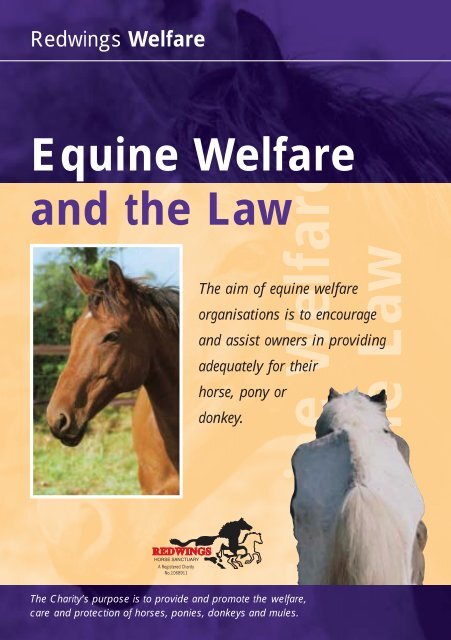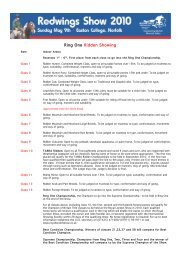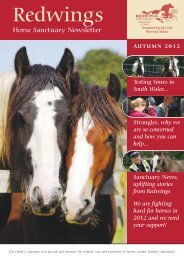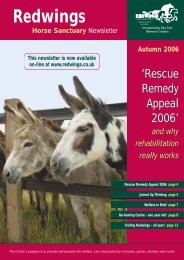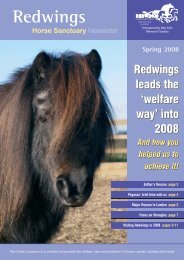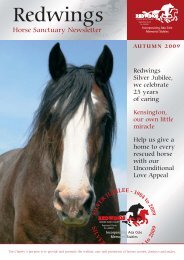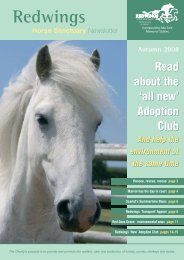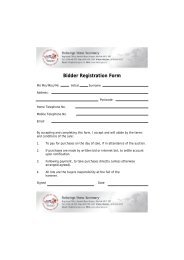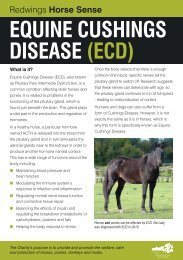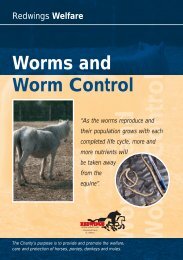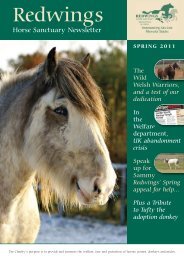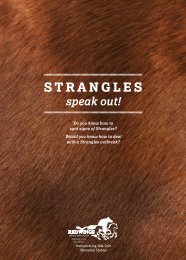Equine Welfare and the Law - Redwings
Equine Welfare and the Law - Redwings
Equine Welfare and the Law - Redwings
You also want an ePaper? Increase the reach of your titles
YUMPU automatically turns print PDFs into web optimized ePapers that Google loves.
<strong>Redwings</strong> <strong>Welfare</strong><strong>Equine</strong> <strong>Welfare</strong><strong>and</strong> <strong>the</strong> <strong>Law</strong><strong>Equine</strong> <strong>Welfare</strong>The aim of equine welfareorganisations is to encourage<strong>and</strong> <strong>the</strong> <strong>Law</strong><strong>and</strong> assist owners in providingadequately for <strong>the</strong>irhorse, pony ordonkey.The Charity’s purpose is to provide <strong>and</strong> promote <strong>the</strong> welfare,care <strong>and</strong> protection of horses, ponies, donkeys <strong>and</strong> mules.
<strong>Redwings</strong> <strong>Welfare</strong>This mare isclearly underweight,but she is notemaciated. It wouldbe difficult for a vetto argue that her lackof condition <strong>and</strong> overgrown forefeet areactually causing her suffering at this stage.In such cases, only advice <strong>and</strong> encouragementcan be offered <strong>and</strong> <strong>the</strong> situation monitored.All equine welfare organisations have towork within <strong>the</strong> boundaries of <strong>the</strong> law. Thelaws which protect equines <strong>and</strong> o<strong>the</strong>rdomesticated animals can be confusing<strong>and</strong> sometimes even contradictory.Members of <strong>the</strong> public often becomeunderst<strong>and</strong>ably frustrated when action isnot taken to rescue animals or prosecuteowners as <strong>the</strong>y may wish. It is hoped that<strong>the</strong> following information will enable aclearer underst<strong>and</strong>ing of current legallimitations <strong>and</strong> why welfare professionalsare often <strong>the</strong>mselves frustrated <strong>and</strong> cannotsimply rescue every horse, pony <strong>and</strong>donkey that is not kept in ideal conditions.The aim of equine welfare organisations isto encourage <strong>and</strong> assist owners inproviding adequately for <strong>the</strong>ir horse, ponyor donkey. The time, effort <strong>and</strong> moneyinvolved in caring for animals need to bemet by <strong>the</strong> people who have responsibilityfor <strong>the</strong>m. Only as a last resort will welfareprofessionals step in to remove an animalfrom its owners <strong>and</strong> take on <strong>the</strong>responsibility for it.In <strong>the</strong> majority of cases, where anorganisation like <strong>Redwings</strong> assesses asituation <strong>and</strong> is concerned that an equine isnot being adequately cared for, our firstpriority is to contact <strong>the</strong> owner <strong>and</strong> discussthose concerns. By offering advice, support<strong>and</strong> encouragement it is hoped that <strong>the</strong>
<strong>Equine</strong> <strong>Welfare</strong> <strong>and</strong> <strong>the</strong> <strong>Law</strong>situation can <strong>the</strong>n be resolved. In caseswhere <strong>the</strong> situation continues to be ofconcern, <strong>the</strong> charity may offer to takeresponsibility for <strong>the</strong> equine if <strong>the</strong> owner iswilling to sign <strong>the</strong> animal over to <strong>the</strong>ir care.Only if <strong>the</strong> owner refuses this option willremoval of <strong>the</strong> equine be considered.To remove an animal without an owner’sconsent, <strong>the</strong> organisation arranging <strong>the</strong>removal must be confident that <strong>the</strong> ownerhas breached animal welfare law. Only acourt of law can pass judgement on <strong>the</strong>owner <strong>and</strong> determine whe<strong>the</strong>r <strong>the</strong> law hasactually been broken. This means that <strong>the</strong>removal of any animal must be followedby prosecution to allow <strong>the</strong> case to beheard <strong>and</strong> a judgement made.1 That <strong>the</strong> animal was suffering.2 That <strong>the</strong> suffering could be clearlydetected.3 That <strong>the</strong> suffering could have beenavoided.Suffering cannot be determined by <strong>the</strong>environment in which <strong>the</strong> animal is kept, by<strong>the</strong> attitude of <strong>the</strong> owner or by assumptionsof what an animal ‘must’ be experiencing ina certain situation. The veterinary diagnosishas to be based on symptoms shown by<strong>the</strong> animal which have <strong>the</strong>n to be directlylinked to <strong>the</strong> actions or neglect of <strong>the</strong>person being prosecuted. On determiningthat an animal is in a suffering state, unlessTo help determine whe<strong>the</strong>r or not <strong>the</strong> lawhas been broken, a veterinary surgeonmust fully examine <strong>the</strong> equine concerned<strong>and</strong> conclude that <strong>the</strong> animal is experiencinga state of ‘unnecessary suffering’.This phrase is central to <strong>the</strong> Protection ofAnimals Act, which was made law in 1911<strong>and</strong> which still forms <strong>the</strong> basis of <strong>the</strong>majority of all welfare legislation today.‘Unnecessary suffering’ is hard to put intoblack <strong>and</strong> white terms. In order to bring asuccessful prosecution, three things mustbe proved beyond reasonable doubtwhich <strong>the</strong>n constitute ‘unnecessarysuffering’. Those three things are asfollows:In this emaciated pony <strong>the</strong> body is having to break downmuscle tissue to generate enough energy to stay alive.This would be generally regarded as chronic suffering asit affects <strong>the</strong> animal’s ability to move around, stay warm<strong>and</strong> maintain <strong>the</strong> function of vital organs like <strong>the</strong> liver<strong>and</strong> heart.
immediate action is needed to preventdeath or long term damage, welfareprofessionals involved will usually discuss<strong>the</strong> situation with <strong>the</strong> owner in order tomake sure that <strong>the</strong>y are fully aware of <strong>the</strong>animal’s needs <strong>and</strong> <strong>the</strong>ir legalresponsibility. In some cases, advice canbe given <strong>and</strong> a time frame will be agreed at<strong>the</strong> end of which <strong>the</strong> welfare agency willvisit again to ensure that <strong>the</strong> appropriateactions have been taken to improve <strong>the</strong>health <strong>and</strong> wellbeing of <strong>the</strong> animalconcerned. It will have been explained to<strong>the</strong> owner that if action has not been taken,<strong>the</strong>y will <strong>the</strong>n be liable for prosecutionunder <strong>the</strong> Protection of Animals Act <strong>and</strong>this is often enough to persuade an ownerto make positive improvements in <strong>the</strong>ir careof an animal.Under <strong>the</strong> current legislation, <strong>the</strong>refore,<strong>the</strong> welfare industry has to evaluate <strong>the</strong>condition of <strong>the</strong> animal, not <strong>the</strong> perceivedneglect of an owner. One animal may beneglected <strong>and</strong> receive very little food but nointervention is possible if it maintains anacceptable bodyweight. Ano<strong>the</strong>r animalmay be in very poor condition but oninvestigation it is found to be underveterinary treatment <strong>and</strong> receiving all <strong>the</strong>care necessary, meaning <strong>the</strong> suffering isnot ‘unnecessary’ because <strong>the</strong> owner isdoing everything <strong>the</strong>y can to remedy <strong>the</strong>situation. It is not uncommon for equinesto be fed or watered by members of <strong>the</strong>public to compensate for apparent neglecton <strong>the</strong> part of <strong>the</strong> owner. Unfortunately,this means that should a welfare officerinvestigate, because <strong>the</strong> animals are fed<strong>and</strong> watered <strong>and</strong> <strong>the</strong>refore not suffering, noaction can be taken. Who provides for <strong>the</strong>irneeds is not currently an issue in<strong>the</strong> eyes of <strong>the</strong> law.The Animal <strong>Welfare</strong> BillNo-one is more frustrated with <strong>the</strong>restrictions of <strong>the</strong> current laws than <strong>the</strong>welfare organisations <strong>the</strong>mselves. Thegovernmental department for <strong>the</strong>environment, farming <strong>and</strong> rural affairs(DEFRA) is currently drafting a new Animal<strong>Welfare</strong> Bill which will improve <strong>and</strong> updatewelfare laws <strong>and</strong> it is working with welfaregroups to make sure that <strong>the</strong> newlegislation is as effective <strong>and</strong> workable aspossible. New bills take a long time to write<strong>and</strong> be approved as statutory law <strong>and</strong> evenif everything goes ahead as planned, <strong>the</strong>Animal <strong>Welfare</strong> Bill in its final form is notlikely to replace <strong>the</strong> Protection of AnimalsAct <strong>and</strong> o<strong>the</strong>r welfare related legislationuntil around 2006.It is hoped that <strong>the</strong> new Bill will give welfareagencies <strong>the</strong> power to step in <strong>and</strong> takeaction if an animal is kept in such a waythat it is likely to experience suffering, ra<strong>the</strong>rthan having to wait until <strong>the</strong> sufferingbecomes evident. For example, <strong>the</strong> ownerof a horse badly te<strong>the</strong>red near a main roadcould be guilty of keeping an animal in amanner likely to cause unnecessary which
<strong>Redwings</strong> <strong>Welfare</strong> Contactssuffering, whereas at present <strong>the</strong> offencewould only be committed once <strong>the</strong> animalhad become loose <strong>and</strong> been causedsuffering by being injured in an accident.The law will also outline a ‘duty of care’which would expect every owner or carer totake basic responsibilities for an animal <strong>and</strong>allow stronger sentences for those foundguilty of an offence under <strong>the</strong> new laws.DEFRADepartment for EnvironmentFood <strong>and</strong> Rural AffairsNobel House17 Smith SquareLondon SW1P 3JR08459 335577www.defra.gov.ukRSPCAWilberforce WaySouthwaterHorshamWest Sussex RH13 9RS0870 5555999www.rspca.org.ukNational <strong>Equine</strong> <strong>Welfare</strong> CouncilStanton10 Wales StreetKings SuttonBanburyOxon OX17 3RRwww.newc.co.ukThis situation is clearly an accident waiting tohappen. Unfortunately, as <strong>the</strong> pony is in reasonablephysical condition, no law has been broken <strong>and</strong>organisations like <strong>Redwings</strong> are powerless to act.Proposed changes to legislation would enablewelfare professionals to step in much earlier, ra<strong>the</strong>rthan having to wait until <strong>the</strong> pony is found in <strong>the</strong> river.<strong>Redwings</strong> Horse SanctuaryHaptonNorwichNR15 1SPHorse Care <strong>and</strong> <strong>Welfare</strong> 01508 481008General Enquiries 01508 481000www.redwings.co.ukPlease look out for updates in <strong>Redwings</strong>’newsletters <strong>and</strong> on our website as <strong>the</strong>Animal <strong>Welfare</strong> Bill progresses. If you wouldlike more information, <strong>the</strong> followingorganisations are also well worthcontacting.
<strong>Redwings</strong> <strong>Welfare</strong> Information<strong>Redwings</strong>’ <strong>Welfare</strong> Team is proactive in <strong>the</strong> promotion of equinecare <strong>and</strong> welfare, believing that access to accurate <strong>and</strong> up-todateinformation is vital if owners <strong>and</strong> carers are to meet <strong>the</strong>needs of <strong>the</strong>ir animal.<strong>Redwings</strong>’ welfare leaflets are designed to provide an overviewof many important issues which are encountered regularly inwelfare cases with which <strong>the</strong> Sanctuary is involved. The seriesincludes information on <strong>the</strong> following topics:■ Laminitis■ Hoof Care <strong>and</strong> Farriery■ Worms <strong>and</strong> De-worming■ Food, Digestion <strong>and</strong> Energy■ Veteran Horses <strong>and</strong> Retirement■ Horse Psychology■ Donkeys■ <strong>Equine</strong> <strong>Welfare</strong> <strong>and</strong> <strong>the</strong> <strong>Law</strong>To request copies of leaflets or to speak to one of <strong>the</strong> teamabout any equine welfare issues, please feel free to contact <strong>the</strong>department by post, phone or email.The <strong>Welfare</strong> Team<strong>Redwings</strong> Horse SanctuaryHaptonNorwichNR15 1SPTel: 01508 481008 (8.30am - 5pm, Monday to Friday)Email: info@redwings.co.uk<strong>Redwings</strong> Horse SanctuaryGeneral Enquiries 01508 481000www.redwings.co.ukMarch05


